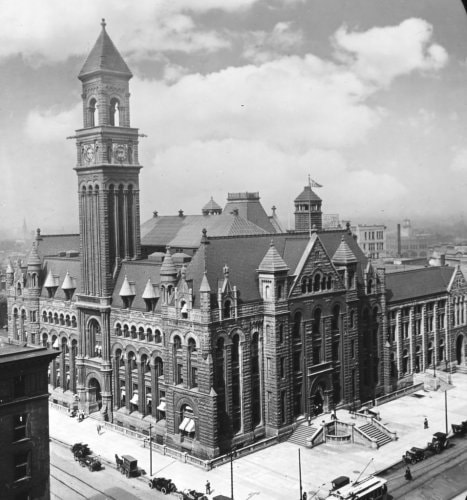Preparing for Prohibition
Late 1919, local authorities and residents were gearing up for the Volstead Act to go into effect January 1, 2020. Though the prohibition of alcohol for consumption had gone into effect in Michigan in May 1917, Detroiters enjoyed a supply from neighboring Ohio. With the Volstead Act drying up all U.S. states, Detroit’s bootleggers turned to a supply chain from Canada. And many of Detroit's doctors had been writing prescriptions for whiskey, which would be filled in Windsor pharmacies just across the Detroit River. The Canadian government had announced on December 10, 1919 that it would lift its war-time prohibition on alcohol (and horse-racing) effective January 16, 2020 and granted amnesty to offenders who were criminalized while the act had been in effect. The manufacturing of liquor would be permitted for shipment from one province to the other. This restricted the sale of intoxicants, but opened up the means, per export permit, for Detroit's neighbors in Windsor to have liquor delivered to their homes for “private consumption.” We know from history that bootleggers, like the Purple Gang, took advantage of this policy to illegally transport Canadian whiskey from Windsor over the Detroit River and Lake St. Clair into Detroit, the Downriver communities and St. Clair Shores. So in 1919, while bootlegging opportunists like the Purple Gang were setting up logistics for importing bonafide Canadian whiskey, other less-sophisticated operators were selling low-grade moonshine. On December 27, 78 deaths were reported in four states (Michigan was not among them) within 48 hours from drinking “fake rum,” which was actually wood alcohol with brown coloring to pass as whiskey. Though Detroiters were spared this tragedy — still enjoying ample, though costly and illegal (but legal from a pharmacy), supply of genuine whiskey -- the move to crack down on alcohol distribution was ramping up by state and federal law enforcement. This led to a series of raids. It was difficult for Detroiters to discern from legitimate law enforcement agents from thieves. For example, the Christmas Eve edition of the Detroit Free Press reported that men posing as state food and drug enforcers seized 8 gallons of “Christmas cheer” from a Detroit man’s cellar.
A Murder Mystery
Following the discovery J. Stanley Brown's murdered body on Romeo Plank Road in Mt. Clemens the morning of Dec. 24, coverage of the investigation into the crime was in Detroit papers each day for the duration of 1919 and well into 1920. Brown, 26, one of four sons of the deceased Detroit cigar magnate John H. Brown, was found with a battered skull and four bullet holes in the back of his neck and head. A wrench sat in a pool of blood near the body. Held for questioning were Brown's 19-year old widow Ruth Prevost Brown, her cousin Lloyd Prevost and, allegedly, his mistress Cecile Beatrice Vester. Brown had been estranged from his wife during the couple’s pending divorce. Two of Brown's three brothers pre-deceased him under mysterious circumstances. One brother died three weeks prior from consuming a licorice drop believed to be poisonous. Another brother reportedly suffered "a violent death" five years prior. In June 1920, Prevost, 24, was found guilty of murdering Brown and lost an appeal. Ten years later, in 1930, witness testimony by a priest led to Prevost's pardon by Governor Fred Green.
The Red Scare
On December 21, 1919 the Freep reported that William D. Haywood, leader of the Industrial Workers of the World, who had been prevented from speaking at Auto Workers Hall Nov. 30 by the Detroit Commissioner, would be permitted to speak at the hall late December. To mitigate a disturbance, members of the newly formed American Legion proposed that admission to the meeting be with ticket only, thereby vetting attendees. The American Legion also urged its members to communicate their disagreeable opinions of the speaker by submitting a formal protest. On Dec. 27, the Freep reported that Detroit Local No. 127, Automobile Aircraft and Vehicle Workers of American passed a bylaw requiring members to resign from the American Legion or pay a $100 fine. The union local viewed the American Legion as a union-breaking entity, as it had effectively interfered with strikes by policemen in Boston, miners in Kansas and longshoremen in New York. The local’s leaders accused the legion’s actions toward union workers as conflicting with the constitutional rights guaranteed by the First Amendment. Early December 1919, the nation experienced “Red Movement” demonstrations calling for the abolishment of capitalism for the establishment of a workers’ republic. On December 20, the U.S. House of Representatives passed a “red-exile” bill, which called for the detainment and deportation of foreign nationals affiliated with “anarchistic organizations.” Included as a punishable radical act was displaying a red flag or banner at a parade. The bill was sponsored by U.S. Rep. Albert Johnson, a Republican who chaired the House Committee on Immigration and Naturalization. Johnson vowed that a bill penalizing American-born citizens who presented Soviet sympathies would follow. On December 21, the Freep reported that 249 foreign nationals accused of being socialists and anarchists were deported on the “Soviet Ark” from New York. The article also reported that many so-called red foreigners were concurrently detained in Detroit, which prompted political protests largely among trade union members near the city’s federal building. The Detroit Free Press reported that roughly 600 men, teenage boys, and women believed to be pro-Soviet radicals or anarchists — foreign nationals and American citizens — were arrested in Detroit on January 2, 1920. (Later reports concluded that it was more than 800 people detained.) According to a November 11, 2019 article in The New Yorker about raids in several American cities that day, these Detroiters were detained for six days in a cramped corridor of the city’s federal building. They shared one toilet and one drinking fountain. They went without food the first 24 hours. Later, the only food they had available was that which their families sent them. The January 4, 1920 edition of the Freep reported that one of the “radicals” still wanted by federal agents was Industrial Workers of the World leader William D. Haywood, who had been granted permission to speak to Detroiters at a meeting just days earlier. With the new year, Haywood was wanted for arrest for his political proselytizing. For more, see The (first) 'Red Scare' and the Founding of the ACLU.
Other Great War-influenced Political Maneuvering
Also making headlines late 1919 and early 1920 were various post-war recommendations from Congressmen toward formation of a peace treaty and international league, which would be known as the League of Nations. On, November 19, 1919 the U.S. Senate had rejected terms of the Treaty of Versailles by a vote of 55 to 39. A resolution ending hostilities with Germany and Austria-Hungary wouldn’t be approved until 1921. On December 10,1919, the American Legion presented a recommendation to the U. S. Senate military committee calling for mandatory service in a large citizen army, arguing that this would reduce and make more efficient the nation’s regular army and thwart military unpreparedness. The resulting bill, submitted to Congress on December 21, proposed a compulsory four months of service in the National Guard by men 18 to 21 years of age. Century-old News and Human Nature Reading 100-year-old newspapers offers insight to what's ageless in society: lovers' quarrels can be deadly; suppressed people will resist power; war destabilizes domestic and international communities; a damaged economy threatens civil society. Detroit news 100 year ago revealed this, as I'm sure the local papers of every major U.S. city had. What other ageless societal traits have you noticed? Other than technology, what is markedly different in society today from 100 years ago? Please share your thoughts in a comment below.
Like what you've read? Become a supporter.
Thank you.
0 Comments
Leave a Reply. |
Categories
All
Like what you've read? Become a supporter.
Thank you.
Archives
June 2023
|





 RSS Feed
RSS Feed
